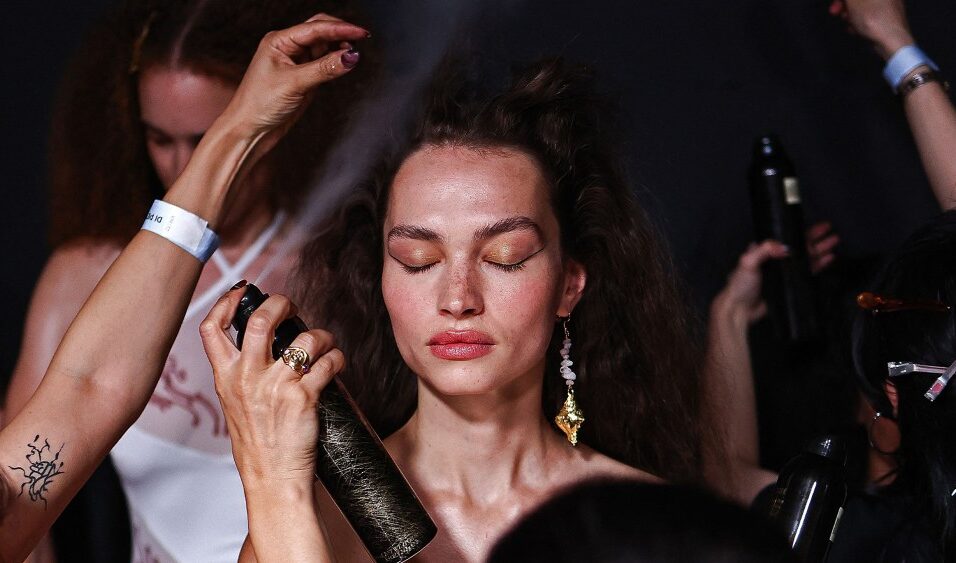Can ‘Emily in Paris’ Catapult Vestiaire Collective Into the American Mainstream?

When “Emily in Paris” debuted on Netflix in October 2020, it was instantly deemed clichéd and reductive by critics.
The comedy series has an outlandish premise: An American ingénue from Chicago, played by Lily Collins, moves to Paris for a job in marketing. Barely speaking the language and clad in over-the-top couture, the titular Emily manages to charm a long list of lovers and clients through various shenanigans.
Three seasons later, and she has charmed everyone else on the other side of the screen. The show has proven to be a sleeper hit: Its latest season, which premiered in December 2022, garnered over 117 million viewership hours, making it the second-most watched English-language TV show in over 90 countries, according to data from Netflix. (The most watched series is “Wednesday,” Netflix’s adaptation of The Addams Family.)
Brands have noticed the potential. Under showrunner Darren Star and costume designer Marylin Fitoussi, a number of luxury labels have made it into the show, including Chopard, Ami Paris and LVMH-owned Rimowa. Site traffic to Rimowa’s website surged following its feature in season two, Emelie De Vitis, Rimowa’s senior vice president of product and marketing, told Rolling Stone in 2022.
It’s no wonder then that when Netflix approached Vestiaire Collective with a storyline and an offer for a paid product placement last year, the resale platform jumped at the opportunity.
In the first episode of the show’s fourth season, which premieres on Thursday, Vestiaire Collective comes up in the storyline of Mindy Chen, played by Ashley Park, Emily’s cash-strapped heiress-turned-singer friend who needs to raise funds for her Eurovision performance. Mindy turns to the platform to sell her designer clothes, and Vestiaire Collective ultimately sells a couture dress on her behalf.
The “Emily in Paris” cameo is part of Vestiaire Collective’s wider strategy to grow its US business, which makes up for 20 percent of its sales. The new season drops at a time when consumers are pulling back from spending, particularly in the luxury sector. This poses an opportunity for resale sites like Vestiaire Collective to convey value to price-conscious shoppers as well as people looking to monetise their closets, said Samina Virk, Vestiaire Collective’s chief executive of its North American arm.
“In a state where the economy is challenging and people are being smarter with their money, secondhand fashion really comes into play,” said Virk.
As part of its expansion playbook, the reseller has partnered with e-tailers such as Mytheresa and LuisaViaRoma, which is also expanding its US business.
But competition is fierce. Currently, the largest online resale players in the US market are eBay, Poshmark and Whatnot, a video-based shopping marketplace, according to analysis from Earnest Research. The data examines all online resale transactions, not only fashion. EBay, which sells everything from vintage couture to kitchen appliances, accounted for 70 percent of the market in the second quarter of 2024. Vestiaire Collective came in at 0.01 percent of market share, behind The RealReal’s 1.8 percent, Poshmark’s 7 percent, ThredUp’s 1.5 percent and Depop’s 3 percent of the overall online resale market.
Vestiaire is betting that its diversified marketing and distribution strategy, as well as increased commission rates for sellers, will allow it to break through in the crowded landscape.
“We feel there’s a lot of opportunity and untapped potential in the US,” said Virk.
A Leg Up on Supply
One of Vestiaire Collective’s biggest objectives this year is to grow the number of sellers on the platform. In the online secondhand market, the matter of supply via sellers is just as competitive as acquiring buyers.
In “Emily in Paris,” Ashley Park’s character Mindy visits a Vestiaire Collective authentication site with a couture dress she is eager to sell off. A consultant for the company meets with her and gives her an estimated payout price of €3,000 ($3,303) before the garment is authenticated — showcasing Vestiaire’s white-glove consignment service. In a matter of minutes, she receives a payment larger than she was quoted.
As part of the “Emily in Paris” push, starting Thursday, the company removed all seller fees and is offering first-time listers on the platform a $50 credit to shop pre-owned garments on Vestiaire Collective’s website.
The US, as a singular luxury market, presents Vestiaire Collective with a unique opportunity to grow its business and reach profitability ahead of its potential IPO. Global CEO Max Bittner has relocated to the US and the company’s US personnel, including its marketing team, has grown significantly, according to Virk.
Joining the Cultural Conversation
Vestiaire Collective’s marketing push won’t stop at “Emily in Paris.”
The resale platform has planned a series of branding activations slated for this autumn as part of its Parlez-Vous Vestiaire Collective campaign, which launched in the spring on social media. The campaign aims to highlight the convenience of selling on the platform and will include a series of closet sales by celebrities. Earlier this year, it enlisted actresses Jessica Chastain and Laura Dern to sell off their pre-owned garments.
Other closet sale collaborators include influencer and former Sartorialist fashion director Jenny Walton; Vogue editor Lilah Ramzi; and model Karen Elson. As part of its partnership with Netflix, Vestiaire will also curate closet sales for the show’s characters including Emily, Mindy and Camille (played by Camille Razat), selecting items from its international pool of sellers that exemplify their eclectic styles.
“We want to drive home the message that on our site you can access and shop the best closets,” said Virk.






Leave feedback about this